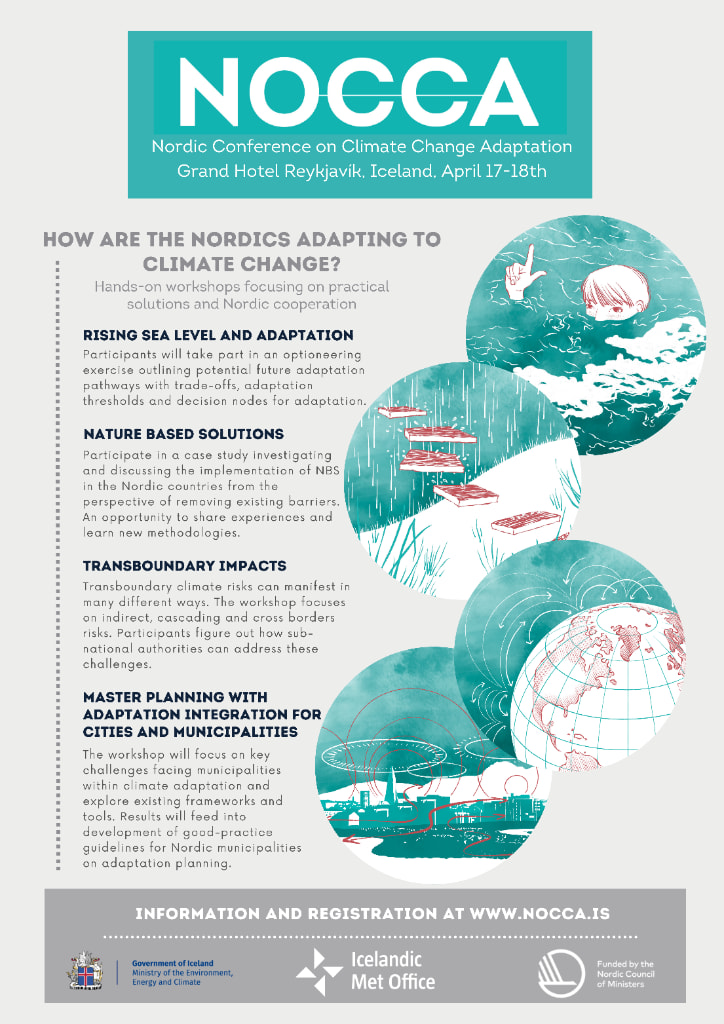Workshops
The workshop day will be on the 18th of April 2023.
The output from the workshops will be synthesized in a policy paper that is aimed to contribute to policy recommendations at future UNFCCC COPs and hopes to inform Nordic engagement and submissions to the Adaptation Committee´s work on the Global Goal on Adaptation as well as the Glasgow-Sharm el Sheik work program on the matter.
The workshop setup will be the following:
1) Three short thematic lectures (around 45 min)
2) Cofffe brake (around 30 min)
3) Workshop session (around 125 min)
4) Sum up (around 30 min)
Note that there will be two parallell workshops before lunch and two parallell workshops after lunch giving participants the option of choosing two workshops.
Look in the program for an updated scedule on each workshop.
BEFORE LUNCH
Participants can chooce between the following two workshops before lunch:
1) Rising sea level and adaptation (more information HERE)

Workshop description:
Due to climate change, low-lying coastal areas all over the world are increasingly threatened by flooding or even permanent inundation due to combinations of sea level rise, storm surges and other extremes, which demands urgent action. In this workshop we will explore climate change adaptation using Dynamic Adaptive Pathway Planning (DAPP). During the workshop, we will consider an optioneering exercise outlining potential future adaptation pathways with trade-offs, adaptation thresholds and decision nodes for adaptation. Here, the adaptation solution space beyond traditional hold-the-line strategies will be considered for long term adaptive planning.
Workshop coordinator: Rick Pieter Kool and Halldór Björnsson
Contact information:
Email: RPKO@NIRAS.DK, halldor@vedur.is
2) Nature based solutions (more information HERE)

Workshop description:
Experience shows that land use and financing of operations & maintenance are seen as two barriers for implementing nature based solutions in projects. Still, nature based solutions have been implemented in the Nordic countries, so there are workarounds. In this workshop we will investigate and discuss the implementation of NBS in the different Nordic countries from the perspective of these themes. The outcome of the workshop is to identify lessons and practices that can be utilized to remove these barriers.
Workshop coordinator: John Sverre Rønnevig
Contact information:
Email: john.ronnevik@asplanviak.no
AFTER LUNCH:
Participants can chooce between the following two workshops after lunch:
1) Transboundary impacts (more information HERE)

Workshop description:
A report produced in 2022 for the Nordic Council of Ministers shows that many of the more serious impacts of climate change may be indirect, cascading and crossing country borders; termed transboundary climate risks (see https://pub.norden.org/temanord2022-531/). This is especially the case in Nordic countries which are both less vulnerable to direct impacts and more exposed to international connections than many other countries. Transboundary climate risks can manifest in many different ways. For example, a severe drought in one country could devastate crops, which could raise the prices of imported food in another. A typhoon or a flood could damage a semiconductor factory in one country, which could limit the production of cars or computers in another. Unrest aggravated by climate-related impacts in one country could contribute to forced migration to another. In this workshop, we will discuss how sub-national authorities can address such risks.
Workshop coordinator: Professor Carlo Aall, leader of the Norwegian research center on sustainable climate change adaptation (Noradapt) and co-author of the above mentioned report
Workshop coordinator: Carlo Aall
Contact information:
Email: caa@vestforsk.no
2) Master planning with adaptation integration for cities and municipalities (more information HERE)

Workshop description:
This workshop will explore and discuss adaptation planning at a local scale, focusing on rural areas and municipalities in the Nordics. The workshop will focus on key challenges facing municipalities within climate adaptation, explore existing frameworks and tools, and sharpen the focus on areas and industries in need of adaptation planning. Results of the workshop will feed into ongoing work of developing good-practice guidelines for Nordic municipalities on adaptation planning, including risk and vulnerability assessments, as well as analysis of adaptive capacity, leading to the set-up of local climate adaptation plans.
Workshop coordinator: Ragnhildur Friðriksdóttir and Magnús Örn Agnesar Sigurðsson
Contact information:
Email: ragnhildur@byggdastofnun.is, magnus.sigurdsson@urn.is
